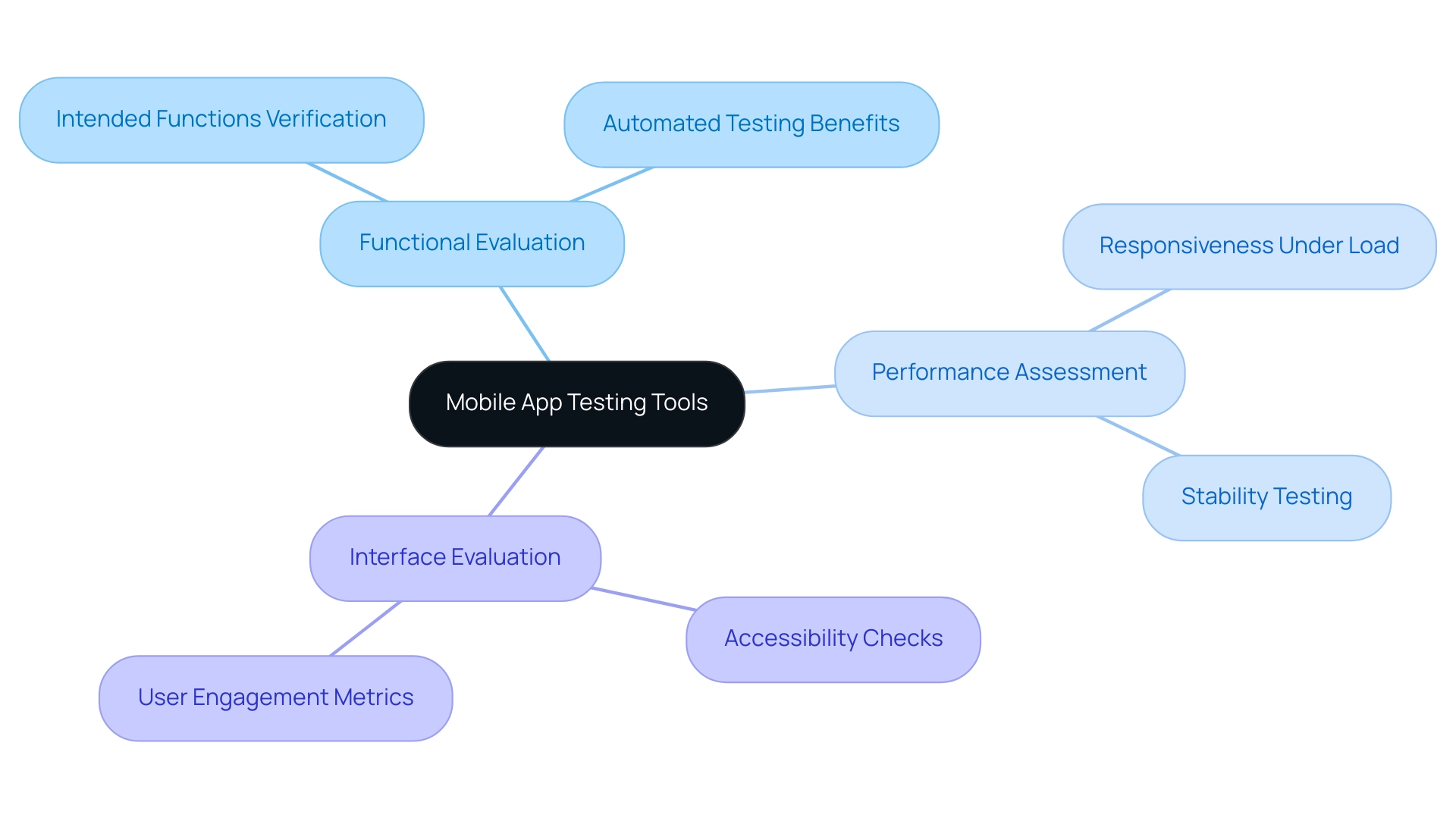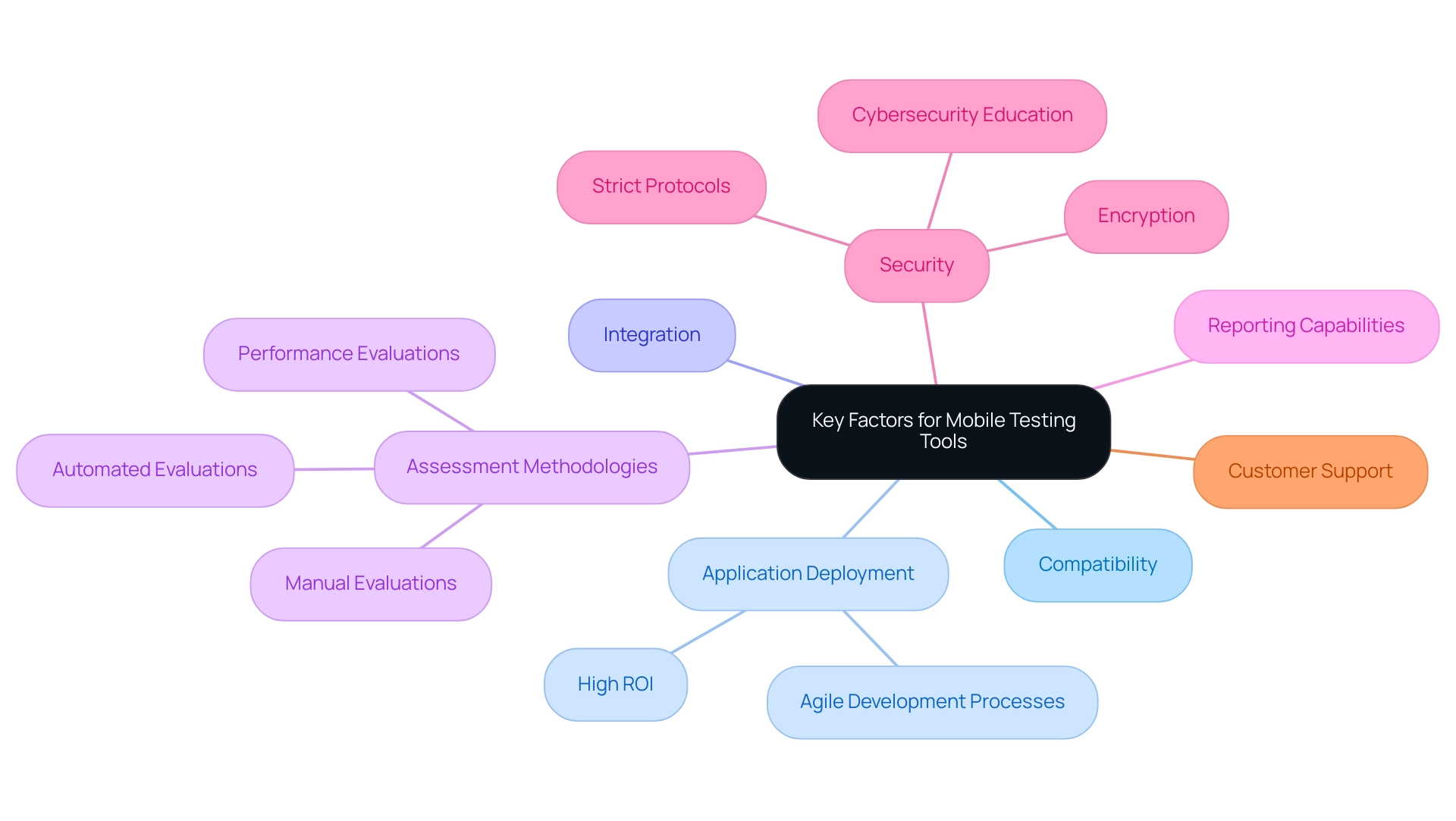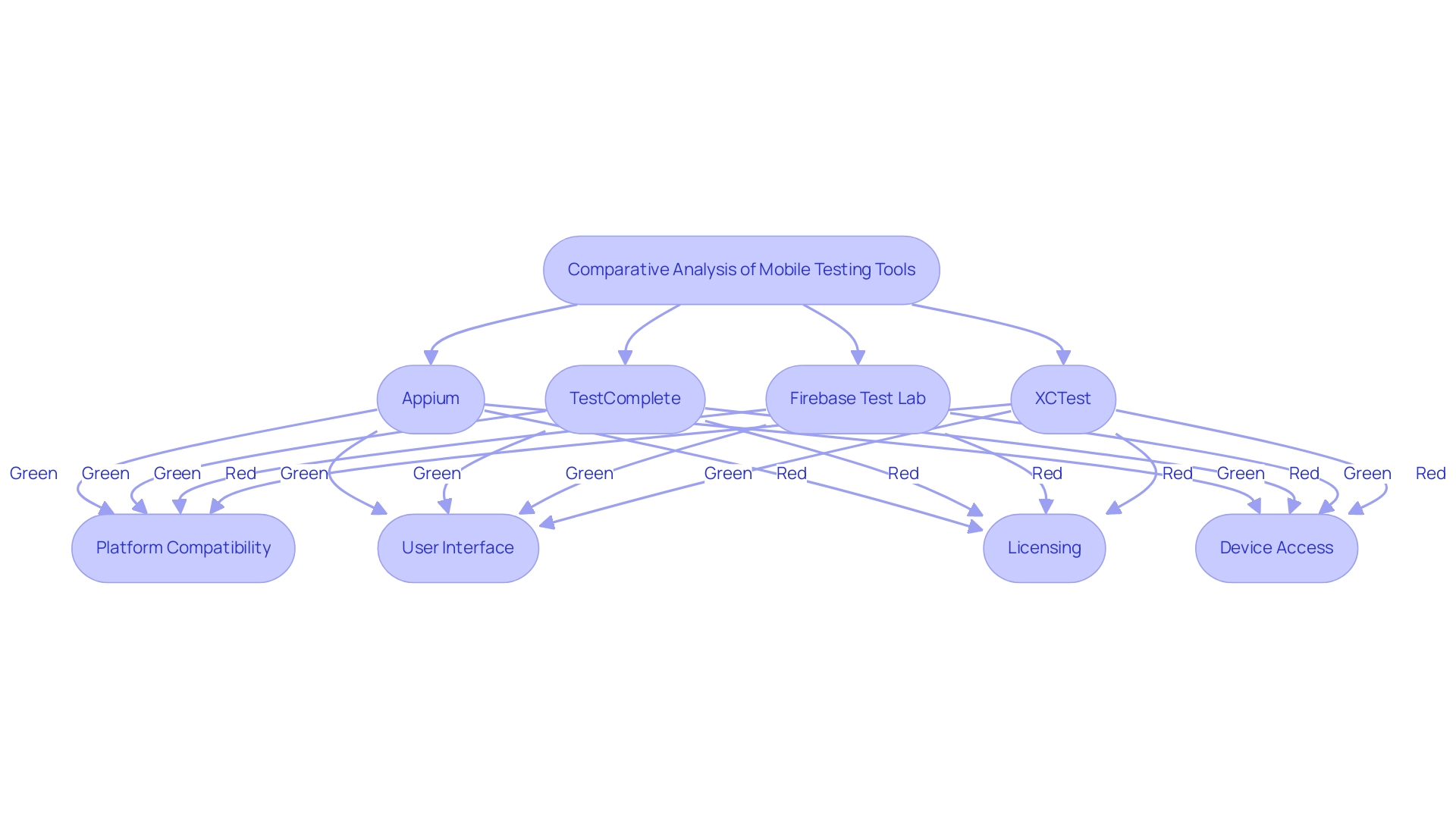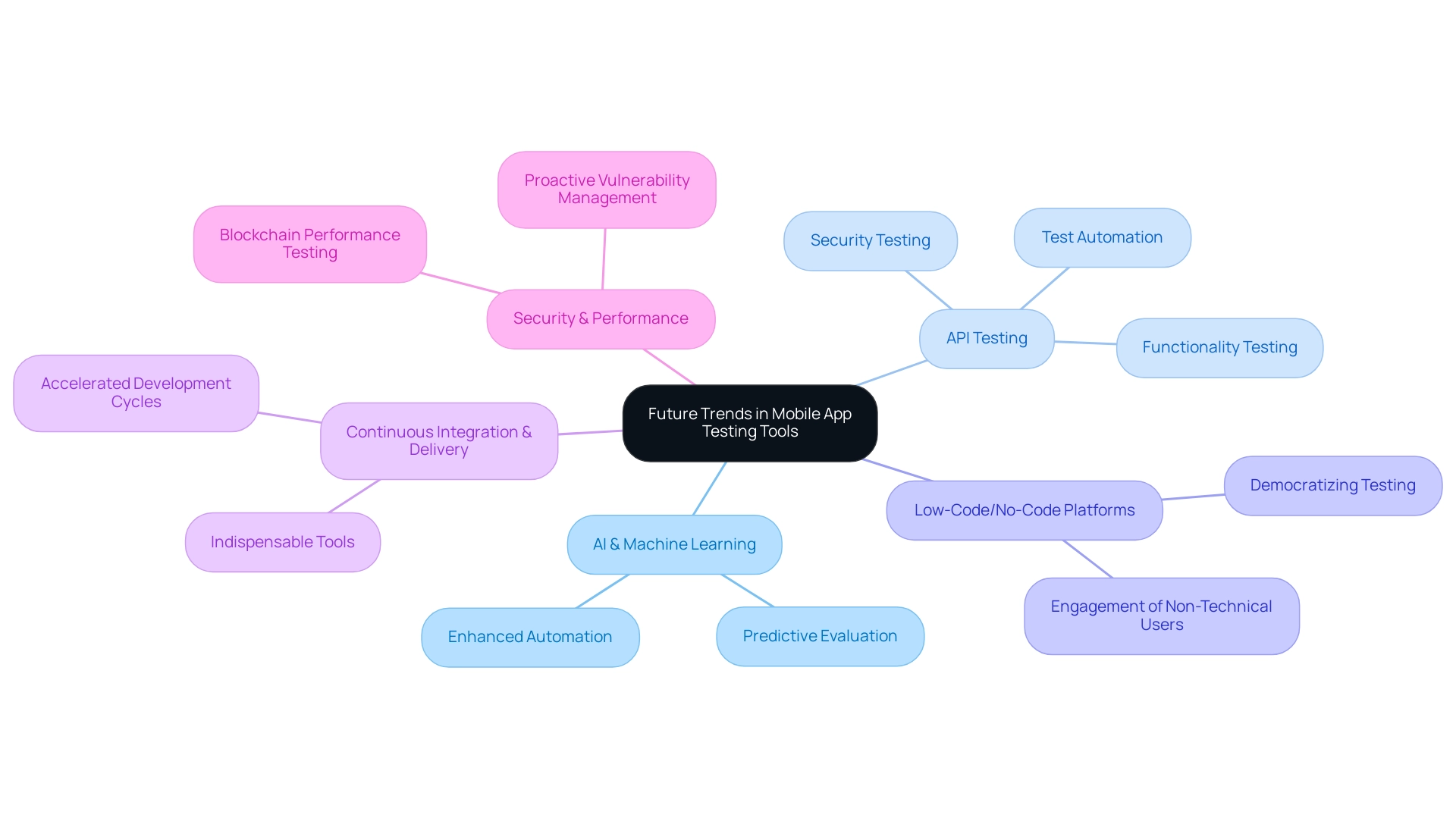Introduction
In the rapidly evolving landscape of mobile application development, ensuring optimal performance and user satisfaction has never been more crucial. As users increasingly rely on mobile devices, the pressure is on developers to deliver seamless, engaging experiences that captivate their audience from the very first interaction.
This article delves into the essential tools and methodologies for mobile app testing, highlighting their pivotal role in enhancing functionality, security, and user engagement. By examining key factors to consider when selecting testing tools, conducting a comparative analysis of leading solutions, and exploring future trends driven by technological advancements, businesses can equip themselves with the knowledge needed to navigate the complexities of mobile app testing effectively.
Understanding Mobile App Testing Tools: An Overview
Mobile apps testing tools are indispensable for ensuring optimal software performance across diverse devices and operating systems. Considering that it requires less than 500 milliseconds—occasionally as brief as 50 milliseconds—to create a positive first impression, the stakes for experience have never been greater. According to Shreya Bose, a prominent community contributor, 'The typical mobile individual checks their smartphone 47 times a day,' emphasizing the crucial demand for tools that are not only functional but also engaging.
Investing in customer experience yields significant returns; for every $1 allocated to UX, businesses can expect a return of $100, equating to an astonishing 9,900%. By automating evaluation processes, developers can conserve time and resources while ensuring the delivery of high-quality applications. Comprehending the different categories of mobile apps testing tools—such as:
- Functional evaluation, which verifies that the app performs its intended functions
- Performance assessment, which examines responsiveness and stability under load
- Interface evaluation, which ensures that the app is accessible
empowers businesses to choose the most suitable solutions tailored to their specific needs.
A case study on Housing.com illustrates this; after redesigning its search functionality and applying targeted evaluation strategies, the platform witnessed a remarkable 20% increase in feature adoption. This demonstrates how concentrated evaluation and improvements can significantly enhance engagement with an app's features.

Key Factors to Consider When Choosing Mobile Testing Tools
When assessing mobile apps testing tools, several critical factors must be prioritized to ensure successful implementation. Compatibility with multiple platforms, notably iOS and Android, is paramount, allowing for a seamless user experience across devices. Additionally, quicker application deployment can be accomplished by merging agile development processes with high ROI, highlighting the effectiveness of the chosen resources.
The ease of integration with existing development environments can significantly streamline workflows, enhancing overall efficiency. The chosen mobile apps testing tools should also accommodate various assessment methodologies, including:
- Manual evaluations
- Automated evaluations
- Performance evaluations
to meet diverse project requirements. Additionally, robust reporting capabilities are essential for tracking progress and identifying areas for improvement, while a user-friendly interface can facilitate smoother adoption by team members.
Security is also a critical consideration; as highlighted by industry experts, "Keep your CAD files safe while collaborating remotely. Use encryption, strict protocols, and cybersecurity education to protect sensitive data." Customer support plays a vital role in addressing any challenges that may arise during the evaluation process.
Ultimately, taking into account your group's expertise and the related learning curve of each resource is essential, as this can directly influence the effectiveness of evaluation procedures and project schedules. A pertinent case study on securing CAD files with remote collaborators illustrates the importance of implementing strict protocols and encryption to protect sensitive data during evaluation.

Comparative Analysis of Leading Mobile Testing Tools
-
Appium: This open-source software excels in its capability to facilitate evaluation across various platforms, making it a versatile option for a range of mobile applications. With robust community support, Appium allows for extensive customization, though it may require a more significant initial setup time to fully leverage its capabilities. Notably, it is among the top evaluation tools identified in the case study 'Best Tools Available in 2024,' underscoring its relevance in the current market.
-
TestComplete: Celebrated for its all-encompassing assessment environment, TestComplete boasts a user-friendly interface that accommodates testers of all levels. Supporting various scripting languages, it enables seamless integration into existing workflows. However, its licensing costs can pose a challenge for smaller teams operating on tighter budgets.
-
Firebase Test Lab: A standout choice for real-time evaluations, Firebase Test Lab excels in providing access to physical devices and extensive integration with other Firebase services. While its cloud-based nature enhances accessibility and scalability, some users may have concerns regarding data privacy and security, necessitating careful consideration before implementation.
-
XCTest: Specifically created for iOS applications, XCTest provides smooth integration with Xcode, ensuring an efficient evaluation process for Apple developers. However, its exclusive focus on iOS limits its versatility compared to other options, potentially restricting its applicability for teams developing cross-platform solutions.
In assessing these resources, each possesses distinct characteristics designed for particular assessment requirements. The optimal choice of mobile apps testing tools ultimately depends on a team's particular requirements, existing infrastructure, and budget constraints. As the automation evaluation market is expected to expand at a CAGR of 16%, the significance of choosing the appropriate mobile apps testing tools cannot be overstated.
As Imed Bouchrika, PhD and Chief Data Scientist, emphasizes, "Identifying and mitigating vulnerabilities, standard to all software lifecycle development (SDLC) efforts, have never been more critical." This emphasizes the importance of employing efficient mobile apps testing tools to ensure robust mobile applications.

Future Trends in Mobile App Testing Tools and Technologies
The landscape of mobile apps testing tools is on the brink of transformation, driven significantly by advancements in artificial intelligence and machine learning. These technologies are set to enhance automation and predictive evaluation capabilities, streamlining the evaluation process and increasing efficiency. With 90% of companies acknowledging the critical need to invest in transformation for continuous delivery, the incorporation of AI in evaluation methodologies becomes paramount.
Furthermore, the rise of APIs in mobile app development necessitates thorough API and service evaluation to ensure functionality and security. This is where test automation plays a crucial role in validating API communication, as illustrated in the case study on API and Service Testing, highlighting its importance in ensuring seamless user experiences. The emergence of low-code and no-code platforms is democratizing the testing process, enabling non-technical team members to engage actively in quality assurance tasks.
As development cycles accelerate, mobile apps testing tools that facilitate continuous integration and delivery will become indispensable. Furthermore, with a growing focus on security and performance, especially in blockchain uses, the demand for integrated solutions that proactively tackle vulnerabilities is increasing, ensuring strong performance and promoting user trust. As we look toward 2024, these trends will not only reshape testing strategies but also enhance the overall quality and security of mobile applications.

Conclusion
The exploration of mobile app testing tools reveals their fundamental role in delivering high-quality applications that meet user expectations. By understanding the various types of testing tools available, such as functional, performance, and user interface testing, developers can make informed decisions that enhance app performance across multiple platforms. The significant return on investment associated with user experience underscores the importance of prioritizing effective testing practices.
When selecting mobile testing tools, it is crucial to consider factors such as:
- Compatibility
- Integration capabilities
- Support for diverse testing methodologies
- Robust reporting functions
These elements not only streamline workflows but also empower teams to address security concerns and improve overall efficiency. A comparative analysis of leading tools like Appium, TestComplete, and Firebase Test Lab illustrates the diversity of options available, each catering to specific project needs and budget considerations.
Looking ahead, the integration of artificial intelligence and machine learning into mobile app testing will revolutionize the industry, enhancing automation and predictive capabilities. As development cycles quicken and security becomes more paramount, embracing emerging trends such as low-code platforms and API testing will be essential. By staying attuned to these advancements, businesses can ensure that their mobile applications not only perform optimally but also foster user trust and engagement in an increasingly competitive marketplace.





